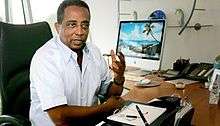Osama Daoud Abdellatif
Osama Daoud Abdellatif is a tycoon Sudanese businessman and the chairman of DAL Group, a large number of companies based in Khartoum, Sudan.[1]

Business
DAL Group
Osama Daoud is the chairman and founder of DAL Group, a large number of companies based in Khartoum, Sudan. DAL Group is present in diverse economic sectors, such as food production, engineering, or retail, through companies such as DAL Motors, DAL Engineering, DAL Food (which includes Sayga flour, the Blue Nile Dairy, Nobo Pasta, ), Sutrac and Sudanese Liquid Air, as well as many other companies.[2]
DAL Group also founded the Khartoum International Community School (KICS) and, as part of their commitment to corporate social responsibility, is active in a number of cultural activities, such as the Sudan Traditional Food Festival or festivals celebrating Sudanese musical traditions.[3]
After inheriting an engineering and tractor company from his father in the 1960s, Daoud rapidly expanded it to its present-day size as Sudan’s largest conglomerate.[4] Despite US-imposed sanctions on trade with Sudan, DAL Food Industries[5] has been official bottler and retailer of the Coca-Cola Company in Sudan.[6]
Personal life
Osama Daoud is married and has six children.
References
- "Sudan tycoon's battle for growth". www.ft.com. Retrieved 2020-06-07.
- "China Interest Helps Sudan, Hurts Darfur". ABC News. 2009-02-09. Retrieved 2018-07-09.
- "Sudan Traditional Food Festival". stff.sd. Retrieved 2020-06-07.
- "Sudan's economy is in trouble, even without sanctions". The Economist. 14 October 2017.
- "Food & Beverages | Dal Group". Retrieved 2020-06-07.
- "US sanctions prohibit US companies from doing any business in Sudan, except in the Southern part. As a result, the two countries have no economic relations, except for a few exceptions that are allowed by the US administration: import of gum arabic for Coca Cola, and a large plant in Khartoum that is owned by the same company. US law does not prohibit from investing in foreign multinationals that operate in or sell to Sudan". Zoltán Vörös: China's role in Africa: The Case of Sudan. Tarrósy, István et al. (eds.), The African State in a Changing Global Context: Breakdowns and Transformations, p. 45. LIT Verlag Münster, Germany, 2011. ISBN 978-3-643-11060-2